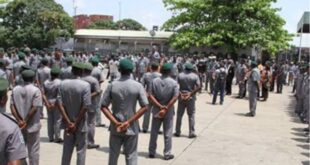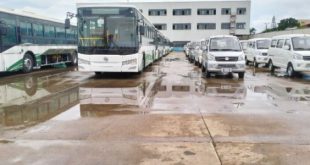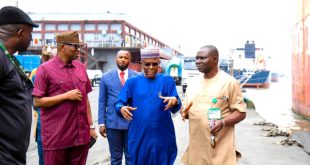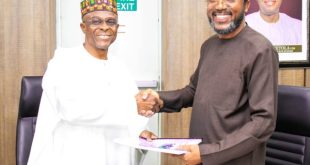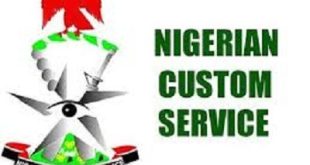-Investigations
–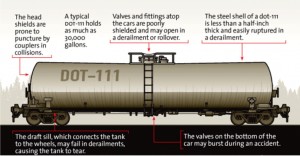
The new 40 railway tank wagons recently acquired by the Nigerian Railway Corporation (NRC) for haukage of petroleum products from Lagos to North have been alleged to be prone to accident because of safety flaws discovered in the early 90s.
Meanwhile, there is an ongoing cannibalization of over 200 old and better rail tank wagons lying fallow in Apapa dockyard, Lagos. NRC ceased to use these tank wagons for over two decades now because of the boom in trucking of petroleum products.

Our findings revealed that the DOT III brand of tank wagon said to have been supplied by a Chinese firm is to be completely, phased out in Canada by 2017 as they cited increased propensity for accidents. This followed the tank wagon derailment in Lac-megantic, Quebec, in July 2013, killing 47 people and spilling 1.6 million gallons of crude.
According to an online publication in Mother Jones Site, “the original DOT III tank car was designed in the 1960s. Its safety flaws were pointed out in the early ’90s. The DOT – III tank cars’ design flaws “create an unacceptable public risk, said Deborah Herseman, the then chair of the United States National Transportation Safety Board as she testify at a Senate hearing in April 2013, while Sen. Charles Schumer has compared the car to a “ticking time bomb.”
Other accident records of DOT-III rail tanker wagons include, in April 2014 in Lynchburg, Virginia, over a dozen tank cars derailed and three fell into the James River as 50,000 gallons of oil spilled; in November, 2013, twenty six, wagons derailed near Wetlands, spilling about 750,000 gallons of bakken crude.
However, a source disclosed to MMS Plus Weekly that the 40 newly acquired tank wagons are not as thick and heavy as the old ones being cannibalized in Apapa.

The Public Relations Officer of NRC, Mr. David Ndakotsu in an interview acknowledged that the old fleet of the tank wagon have been sold as scrap to the highest bidder for an undisclosed amount, but surprisingly at the same breathe said the old fleet had been taken to the NRC workshop.
MMS Plus Weekly findings revealed that the idea of scrapping the old fleet caused division among the Board of Directors of NRC. While other members subscribed to scrapping, the Managing Director of NRC, Mr Adeseyi Sijuwade objected. But the Board had its way.
According to our source, all they needed to do was “sandblast them (old fleet) and paint and you have a brand new tanker. Cannibalizing them is to melt them for some other uses. In other climes, new gauges would have been provided to replace the aged ones. These tankers were used by British Petroleum (BP).”
The suppliers of the 40 new fleet did not indicate the thickness of the new product, rather they only disclosed that each wagon has a loading capacity of 40 tonnes; axle load of 16.5 tonnes; tare weight of 22 tonnes and a total volume of 45m3, which is equivalent of a capacity of 45,000 liters.
Read the interview with the image-maker of NRC for more discoveries. Excerpts
Mr. David Ndakotsu is an Assistant Director, Public Relations of Nigerian Railway Corporation (NRC). He spoke with MMS Plus Weekly crew of Ifunanya Ajah and Jerry Iziogo on some gripping issues in the NRC.
What is the number of passengers that patronized the railway before the successive government intervention?
I cannot give you the exact figure, but it is very large, it has always been in large numbers. And I would not want to say before the government intervention because government has always intervened in the railways because the corporation belongs to the government. It is a public institution established by the government.
What about the number of passengers in a train?
If you want to say the number of passengers we carry in Lagos, I know we carry almost 15,000 passengers in a day because we run 18 trips; every one hour a train is going and coming between Lagos and Ogun state.
What are the routes in Lagos?
Our trains in Lagos ply between Ido and Ijoko; Ido and Alagbado and we have another one from Apapa to Ijoko and Alagbado, and they are passenger trains. We also have other chattered trains like excursion ride; conference on wheels, and just recently we introduced premium class diesel multiple engine targeted at corporate clients and middle class who want to feel or experience the train ride on a very high level and it is running successfully.
What kind of bulk and wet cargo do you carry?
We run freight train which is where we generate more revenue. We are bulk carriers. We carry cement for Lafarge, Ewekoro, Dangote; Wheat for flour mills of Nigeria from Apapa to Kaduna and Kano. We also carry steel products from Apapa; we carry vehicles from Apapa to Kaduna. We also freight containers, and petroleum products for some independent marketers and contractors.
What is the cost of the 20 tankers that were recently bought in NRC?
I cannot give you the exact cost of the tankers, but all I know is that about 20 of them so far have been delivered, and we are using them to carry petroleum products.
What about the make of these tankers?
They were made in China, China is the largest manufacturer of railway infrastructure in the world like coaches, wagons, locomotives.
Are these tankers of Aluminum make?
No they can’t be of aluminum make. Tankers are steel products, coaches and a locomotive are combination of many things, just like a car, car is made up of many things.
Why is it that NRC did not make use of the old tanker fleet littering Apapa Port Dockyard?
We are refurbishing them in our workshop in Lagos.
We saw those tankers being cannibalized, we learnt it has been sold by the Board of NRC as scrap, at what cost were they scrapped?
I have no idea because it goes directly to the federal government treasury.
Who were they sold to?
To the bidders, that is those who won the contract.
In summary, can you give us the statistics of both passengers and cargo freights for this year and in the last two or three years?
The number could be minimum of 40 – 45 thousand
In what ways are you experiencing changes in NRC?
The number of our passengers increasing everyday, and that is why the government is buying the coaches and locomotives for us, because of high the demand of train services.
Why did you buy DOT III brand rail tankers that are prone to accidents?
How is it prone to accident, have we had any accident?
Accident rarely occur with train. Train is the safest means of transportation. Whosoever that is telling you that the tankers are prune to accident has an interior motive, how can you be praying that the trains should have accident. Everything on earth is prune to accident, even human beings fall down, it is an accident.
You made mention of people abandoning their private cars for train, which area does this happen?
In Lagos here and Ogun state, you see people leaving their vehicles at the railway stations and taking train to their various places of work. After their working hours, they come back, take their vehicles and go.
What do you think are the reasons behind this?
Because people now prefer train as a result of the state of some roads, the congestions on the roads, take for an instance, what is happening at Apapa express way. It is a matter of preference.
 MMS PLUS NG – Maritime, Aviation, Business, Oil and Gas News Online Newspaper with coverage in Maritime, Oil and Gas, Aviation, Power and Energy as well as Financial News
MMS PLUS NG – Maritime, Aviation, Business, Oil and Gas News Online Newspaper with coverage in Maritime, Oil and Gas, Aviation, Power and Energy as well as Financial News





